Tuesday, 21 November 2017
Conceptual evolution in some explanations in neuroscience
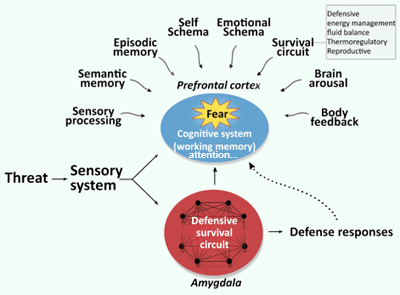
This website and this blog have been around long enough now (over 15 years and nearly 7 years, respectively) to have witnessed the ongoing evolution and refinement of certain concepts in the neurosciences. We all know that science evolves, but it can be interesting to see how. That’s what I’d like to show today, using an example of conceptual evolution. This example relates to the amygdalae—the two almond-shaped groups of neuronal nuclei on either side of the brain that were associated with human fear reactions very early in the history of neuroscience. Indeed, studies such as those by Joseph LeDoux have shown that when a threatening stimulus is presented to rats or humans, the neurons in each amygdala in their brains become highly active.
But as brain-imaging studies became more common, they showed that the activity in someone’s amygdala could also increase in other situations as well (for example, when that person was extremely hungry or saw a loved one suffering). (more…)
Emotions and the Brain | No comments
Thursday, 26 October 2017
The Brain, The Body and the Environment: We Need All Three To Make Thinking Possible
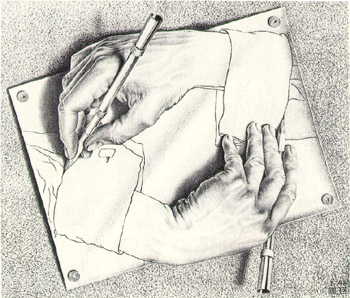
The third and final session of my course at UPop Montréal started by asking whether our brains really process our most abstract concepts in the way proposed by cognitivist theory: that is, as arbitrary symbols that have nothing to do with the sensory modalities by which these “inputs” are entered. But as early as the 1960s, experiments with the mental rotation of objects seemed to suggest that, on the contrary, when we perform “high-level” mental manipulations of this kind, we employ the sensory regions of our brain to do so. (more…)
Body Movement and the Brain | No comments
Wednesday, 11 October 2017
The Brain and Body Are Really One, Especially When It Comes to Emotions
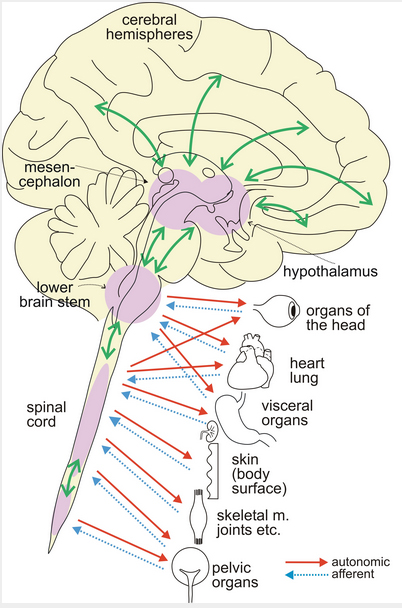 In April 2017, while preparing a lecture for a course on embodied cognition that I teach in French at UPop Montréal, I had to refresh my memory about the major communication pathways between the brain and the rest of the body, and one thing that struck me was just how many of these pathways there are!
In April 2017, while preparing a lecture for a course on embodied cognition that I teach in French at UPop Montréal, I had to refresh my memory about the major communication pathways between the brain and the rest of the body, and one thing that struck me was just how many of these pathways there are!
I won’t talk here about the communication pathways that are part of the hormonal and immune systems. Instead, I’ll focus on the pathways in the nervous system alone. (more…)
Emotions and the Brain | No comments
Tuesday, 26 September 2017
The Brain: The History of an Organ Like No Other
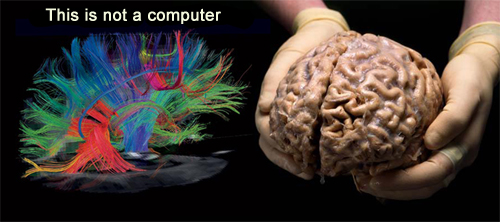 In the spring of 2017, I had to give a one-hour basic lecture about the human brain as part of a a free course for the general public at UPop Montréal. With so many different possibilities, deciding what approach to take in my lecture was no small challenge. In the end, I decided to start by trying to explain what the brain is not and dispelling a number of frequent misconceptions.
In the spring of 2017, I had to give a one-hour basic lecture about the human brain as part of a a free course for the general public at UPop Montréal. With so many different possibilities, deciding what approach to take in my lecture was no small challenge. In the end, I decided to start by trying to explain what the brain is not and dispelling a number of frequent misconceptions.
Most of the metaphors that compare the brain with a computer are pretty misleading, so I began by taking them apart, and then replacing them with others that better account for the selective, self-organizing dynamic processes that take place in the human brain and make the subtlest mental states possible. Thus, instead of comparing the brain to a computer, I used metaphors such as strange attractors in chaos physics and the complex flow patterns in a mountain stream—metaphors that can embrace both the long evolutionary history of the human brain, which accounts for its overall structure, and the neural networks that develop in an individual’s brain through a process of selection over that person’s lifetime. (more…)
From the Simple to the Complex | No comments
Monday, 21 August 2017
Humans Are the Product of Dynamic Processes on Multiple Time Scales
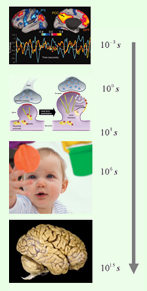
Today I want to talk about dynamic processes that occur on some very different time scales in the human nervous system. To do so, I will describe four examples very briefly, referring to the two graphics in this post.
The first of these processes, represented at the bottom of each graphic, is the evolution of the human nervous system, which occurs on the longest of these time scales, measured in millions of years. Over these very long periods, sexual reproduction has accelerated the diversification of our nervous systems by regularly producing variants or mutations. Some of these variants have proved capable of viable structural couplings with certain environments and have thus enabled their lucky owners to pass these nervous systems down to their descendants. I am purposely avoiding saying that these nervous systems are “better adapted to their environment”, so as not to imply that part of this environment is unchanging or that there is always some optimal level of adaptation that organisms can achieve. To state it succinctly, evolution is more proscriptive than prescriptive: it of course eliminates certain mutations that are too incapable of viable coupling with their environment, but it “allows” all the rest. (more…)
Emotions and the Brain | No comments







